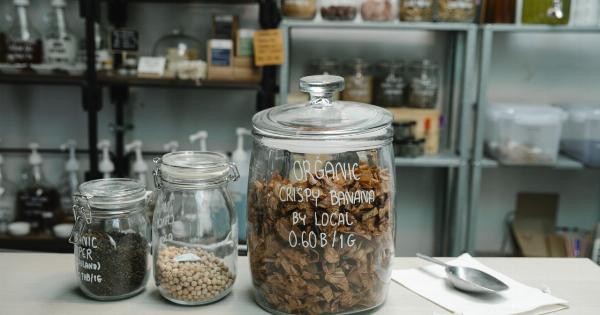As we age, our lungs naturally undergo changes that can reduce their efficiency and capacity. However, certain foods can play a crucial role in maintaining lung health and even slow down the aging process.
Incorporating these foods into your diet can help strengthen your respiratory system and keep your lungs functioning optimally. Here are the top 30 foods that may help reduce lung aging:.
1. Broccoli
Broccoli is a nutritional powerhouse, packed with antioxidants and anti-inflammatory properties that can benefit lung health. It contains sulforaphane, a compound that helps protect against the oxidative stress associated with aging.
2. Spinach
Spinach is rich in nutrients such as vitamins A, C, and E, as well as antioxidants and folate. These components can support lung health by reducing inflammation and preventing oxidative damage to lung tissues.
3. Berries
Berries, such as blueberries, strawberries, and raspberries, are abundant in antioxidants that can help combat cellular damage caused by free radicals. Including berries in your diet may help protect against lung aging and maintain respiratory health.
4. Garlic
Garlic has immune-enhancing properties and contains compounds that can assist in reducing inflammation. Its high levels of allicin can support lung health by protecting against infections and minimizing lung tissue damage.
5. Turmeric
Turmeric contains a chemical called curcumin, which exhibits anti-inflammatory and antioxidant effects. Incorporating turmeric into your diet may aid in reducing inflammation in the lungs and potentially slow down the aging process.
6. Watermelon
Watermelon is a hydrating fruit that is rich in lycopene, an antioxidant known for its anti-aging properties. Lycopene can help protect lung tissues from oxidative damage and reduce the risk of respiratory conditions associated with aging.
7. Tomatoes
Tomatoes are an excellent source of vitamins A and C, as well as antioxidants such as lycopene. Consuming tomatoes can support lung health and reduce the risk of age-related respiratory diseases.
8. Green Tea
Green tea is packed with antioxidants called catechins, which have been linked to numerous health benefits, including lung health. Regular consumption of green tea may help reduce lung inflammation and oxidative stress.
9. Ginger
Ginger possesses anti-inflammatory properties that can reduce inflammation in the respiratory system. It may also help improve lung function and alleviate symptoms of respiratory conditions associated with aging.
10. Nuts
Nuts, such as almonds and walnuts, are rich in vitamin E, omega-3 fatty acids, and antioxidants. These components can promote lung health by reducing inflammation and protecting against oxidative damage.
11. Carrots
Carrots are high in beta-carotene, a precursor to vitamin A, which is crucial for lung health. Vitamin A helps maintain the integrity of lung tissues and can reduce the risk of respiratory conditions.
12. Oranges
Oranges are a rich source of vitamin C, which is essential for the production of collagen. Collagen plays a vital role in maintaining the elasticity of lung tissues and reducing the risk of lung aging.
13. Fish
Fatty fish, such as salmon and mackerel, are excellent sources of omega-3 fatty acids. These healthy fats can help reduce inflammation in the lungs and support overall respiratory health.
14. Avocados
Avocados are rich in antioxidants, vitamins, and healthy monounsaturated fats that can benefit lung health. Including avocados in your diet can help reduce inflammation and oxidative stress in the respiratory system.
15. Beans and Legumes
Beans and legumes are packed with soluble fiber, antioxidants, and vitamins that can support lung health and slow down the aging process. They also provide a good source of protein for overall respiratory function.
16. Red Bell Peppers
Red bell peppers contain high levels of vitamins A and C, as well as antioxidants that promote lung health. Consuming red bell peppers can help protect against respiratory conditions and reduce oxidative stress in the lungs.
17. Pomegranates
Pomegranates are rich in antioxidants called punicalagins, which have been shown to have anti-inflammatory effects. Regular consumption of pomegranates may help reduce lung inflammation and protect against oxidative damage.
18. Onions
Onions contain several compounds, including quercetin, which possess antioxidant and anti-inflammatory properties. Including onions in your diet can help reduce lung inflammation and protect against respiratory conditions.
19. Kiwi
Kiwi is loaded with vitamins C and E, as well as antioxidants that can support overall respiratory health. Including kiwi in your diet may help reduce oxidative stress and inflammation in the lungs.
20. Olive Oil
Olive oil is a healthy source of monounsaturated fats that can help reduce inflammation and support lung health. Its antioxidant properties can protect against oxidative damage and promote respiratory well-being.
21. Dark Chocolate
Dark chocolate with a high percentage of cocoa is rich in antioxidants that can benefit lung health. The flavonoids in dark chocolate may help reduce inflammation and prevent respiratory aging.
22. Green Leafy Vegetables
Green leafy vegetables, such as kale and Swiss chard, are packed with vitamins A, C, K, and other essential nutrients. These vegetables can help improve lung function and maintain optimal respiratory health.
23. Seeds
Seeds, such as flaxseeds and chia seeds, are rich in omega-3 fatty acids and antioxidants that promote lung health. Including seeds in your diet can help reduce inflammation and support overall respiratory function.
24. Citrus Fruits
Citrus fruits, like grapefruits and lemons, are high in vitamin C and antioxidants. Vitamin C enhances lung health by supporting the immune system and reducing the risk of age-related respiratory conditions.
25. Yogurt
Yogurt contains probiotics, which can support a healthy gut microbiome and enhance respiratory health. A balanced gut microbiome is crucial for optimal immune function and reduced inflammation in the lungs.
26. Whole Grains
Whole grains, such as quinoa and brown rice, provide essential nutrients and fiber that support overall health, including lung health. Including whole grains in your diet can help reduce inflammation and oxidative stress.
27. Mushrooms
Mushrooms have been shown to have immune-enhancing properties and may help reduce the risk of respiratory infections. Their anti-inflammatory effects can contribute to improved lung function and respiratory well-being.
28. Bell Peppers
Bell peppers, especially red and yellow varieties, are rich in vitamins A and C, as well as antioxidants. These components can support lung health by reducing inflammation and protecting against oxidative damage.
29. Eggs
Eggs are a good source of essential nutrients, including vitamins A and E, which promote lung health. They also contain antioxidants that can protect against oxidative stress and support respiratory function.
30. Lentils
Lentils provide plant-based protein, fiber, and essential nutrients that support lung health. Their anti-inflammatory properties can help reduce the risk of respiratory conditions associated with aging.





























